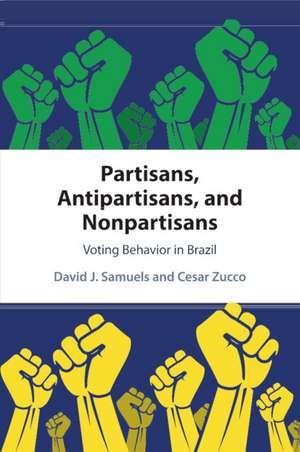Partisans, Antipartisans, and Nonpartisans: Voting Behavior in Brazil
Autor David J. Samuels, Cesar Zuccoen Limba Engleză Paperback – 14 oct 2020
Preț: 281.30 lei
Nou
Puncte Express: 422
Preț estimativ în valută:
53.83€ • 56.20$ • 44.55£
53.83€ • 56.20$ • 44.55£
Carte tipărită la comandă
Livrare economică 04-18 aprilie
Preluare comenzi: 021 569.72.76
Specificații
ISBN-13: 9781108451628
ISBN-10: 1108451624
Pagini: 198
Ilustrații: 38 b/w illus. 21 tables
Dimensiuni: 150 x 230 x 12 mm
Greutate: 0.3 kg
Editura: Cambridge University Press
Colecția Cambridge University Press
Locul publicării:New York, United States
ISBN-10: 1108451624
Pagini: 198
Ilustrații: 38 b/w illus. 21 tables
Dimensiuni: 150 x 230 x 12 mm
Greutate: 0.3 kg
Editura: Cambridge University Press
Colecția Cambridge University Press
Locul publicării:New York, United States
Cuprins
1. Introduction; 2. Partisanship and antipartisanship in Brazil; 3. The strength of partisan attitudes in Brazil; 4. The rise (and decline) of Petismo; 5. Partisanship, antipartisanship, and voting behavior; 6. Partisanship and antipartisanship in comparative perspective; 7. Parties, voters and Brazilian democracy; References; Index.
Recenzii
'Samuels' and Zucco's meticulously researched book is a major contribution to the evolving concept of negative partisanship. It is also a marvelous dissection of the recent travails of Brazil's Workers' Party (PT). Few works on Brazilian politics have been so theoretically and comparatively informed, or have rivalled the rigorous methodological standards of this study.' Timothy J. Power, University of Oxford
'Theoretically informed and empirically rich, Partisans, Antipartisans, and Nonpartisans analyzes the important impact of the PT, anti-PT divide in structuring political attitudes and voting behavior in Brazil for the past three decades. By differentiating negative partisanship from nonpartisanship, Samuels and Zucco advance our understanding of mass political behavior in the country. At this time of marked political turmoil, their analysis sheds light on the possible contours and patterns likely to emerge.' Wendy Hunter, University of Texas, Austin
'Samuels and Zucco make a forceful case that partisanship matters, even in the unlikeliest of contexts. They skillfully study how partisanship - both positive and negative - emerged in Brazil, and the political consequences it had. They have written not only the book on partisanship in Brazil, but also a must-read for anyone interested in public opinion, voting, or political parties more generally.' Noam Lupu, Vanderbilt University, Tennessee
'Partisans, Antipartisans, and Nonpartisans: Voting Behavior in Brazil is an excellent contribution by two major scholars. Samuels and Zucco offer a major and innovative theoretical contribution in rethinking how partisanship and anti-partisanship shape party politics in and beyond Brazil.' Scott Mainwaring, Harvard University, Massachusetts
'A major contribution to our understanding of anti-partisanship and a valuable corrective to much of the received wisdom that dominated our understanding of Brazilian politics in the 1990s and 2000s.' Taylor C. Boas, Boston University
'Theoretically informed and empirically rich, Partisans, Antipartisans, and Nonpartisans analyzes the important impact of the PT, anti-PT divide in structuring political attitudes and voting behavior in Brazil for the past three decades. By differentiating negative partisanship from nonpartisanship, Samuels and Zucco advance our understanding of mass political behavior in the country. At this time of marked political turmoil, their analysis sheds light on the possible contours and patterns likely to emerge.' Wendy Hunter, University of Texas, Austin
'Samuels and Zucco make a forceful case that partisanship matters, even in the unlikeliest of contexts. They skillfully study how partisanship - both positive and negative - emerged in Brazil, and the political consequences it had. They have written not only the book on partisanship in Brazil, but also a must-read for anyone interested in public opinion, voting, or political parties more generally.' Noam Lupu, Vanderbilt University, Tennessee
'Partisans, Antipartisans, and Nonpartisans: Voting Behavior in Brazil is an excellent contribution by two major scholars. Samuels and Zucco offer a major and innovative theoretical contribution in rethinking how partisanship and anti-partisanship shape party politics in and beyond Brazil.' Scott Mainwaring, Harvard University, Massachusetts
'A major contribution to our understanding of anti-partisanship and a valuable corrective to much of the received wisdom that dominated our understanding of Brazilian politics in the 1990s and 2000s.' Taylor C. Boas, Boston University
Notă biografică
Descriere
The book demonstrates the underappreciated extent and political importance of both positive and negative mass partisan attitudes in Brazil.
